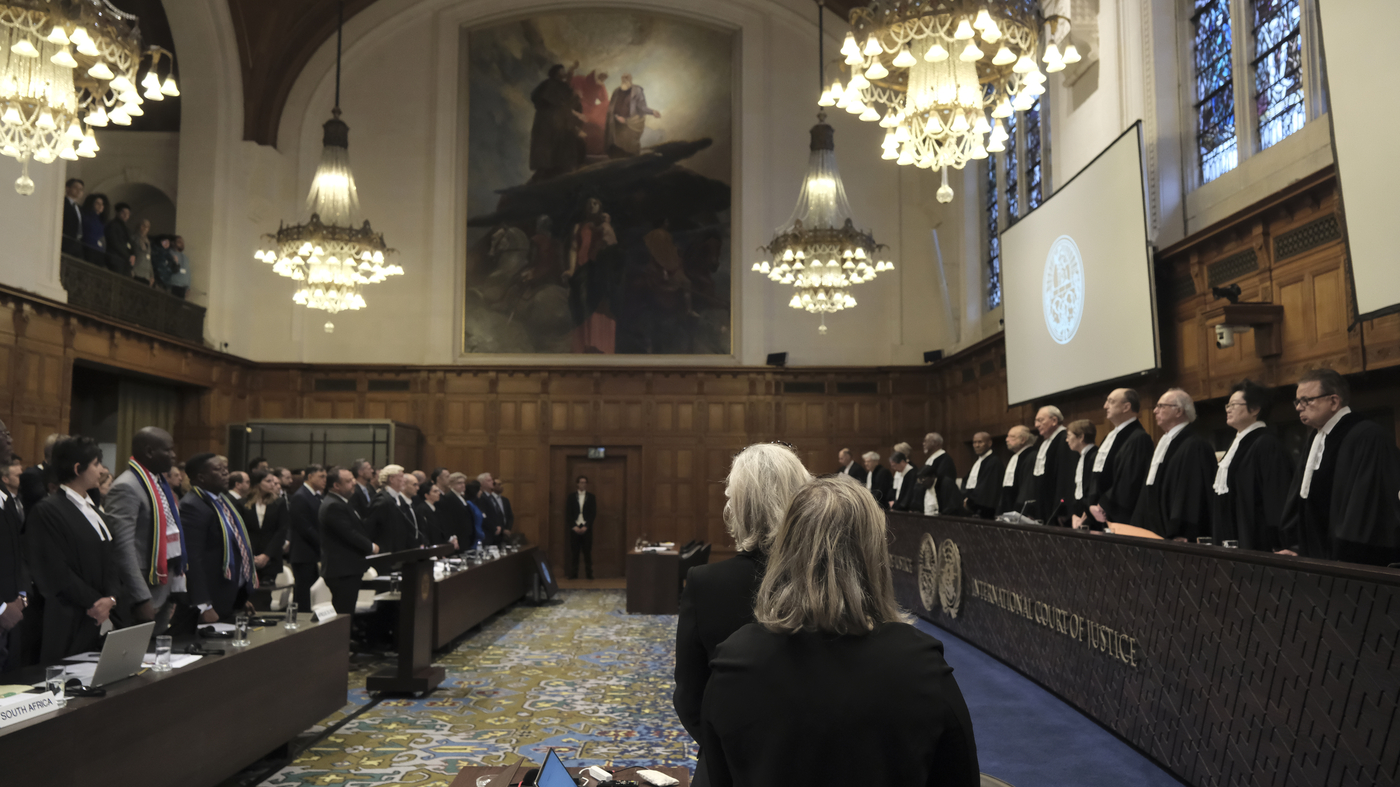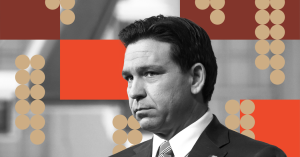
There are three things to know about the case against Israel
Israel is “singularly aware” of the Genocide Convention, and Israel does not intend to end the hostilities against Hamas
Becker told the court that if Hamas surrenders and releases its hostages, Israel’s hostilities against the group would end. The Israeli presentation acknowledged the suffering of civilians in Gaza, but argued it has no genocidal intent. The civilian toll, Israel argued, is the consequence of Hamas’ practice of waging war among noncombatants.
In Israel’s opening arguments before the court on Friday, Israeli lawyer Tal Becker said Israel is “singularly aware” of why the Genocide Convention was adopted, referring to the systematic murder of 6 million Jews in the Holocaust, which gave birth to the convention invoked in these proceedings.
Netanyahu responded quickly to the testimony. He said that the hypocrisy of South Africa knows no bounds in his video statement immediately after the first day of testimony. “The state of Israel is accused of genocide at a time when it is fighting genocide.”
“This refers to the biblical command by God to Saul of the retaliatory destruction of an entire group of people,” said South African legal scholar Tembeka Ngcukaitobi, who said Netanyahu’s reference was meant to justify genocide.
South Africa’s delegation insisted that genocidal intent is shown not only by the way Israel has launched its military campaign, but by comments from leaders like Prime Minister Benjamin Netanyahu. Netanyahu spoke to Israeli forces in October about a story in the Hebrew Bible about a person who tried to destroy the Jewish people.
Two Israeli airstrikes on the Gaza Strip killed more than 30 Palestinians, including children, as concerns continued to grow over a lack of fuel and supplies for overburdened hospitals. In the video provided by Gaza’s Civil Defense department, rescue workers were able to see through the twisted rubble of a home that was hit by an Israeli attack. A young girl with injuries to her face, and two other children who appeared dead, were shown in footage. A boy covered in dust is being loaded into an ambulance. The attack on the home in the Daraj neighborhood killed at least 20 people in total, according to Civil Defense spokesperson Mahmoud Bassal. Another strike near the southern city of Rafah on the Egyptian border killed at least 13 people, including two children. The bodies of those killed, primarily from a displaced family from central Gaza, were taken to the city’s Abu Youssef al-Najjar hospital where they were seen by an Associated Press reporter. The Health Ministry in Hamas-run Gaza says 135 Palestinians were killed in the last 24 hours. The count does not differentiate between combatants and civilians, but the ministry has said about two-thirds of the dead are women and children. The total number of war-wounds passed 60,000, the ministry said. Hamas has argued that its fighters make use of civilian buildings to launch attacks in densely populated urban areas.
Hassim said the Israeli military dropped 6,000 bombs a week in the first three weeks of the campaign and that 2,000 pound bombs were dropped on areas declared safe by Israel.
In nearly three hours of testimony, lawyers and experts on behalf of South Africa presented evidence arguing that Israel’s three-month-long military campaign in Gaza has gone beyond a war with Hamas — the Palestinian militant group that attacked Israel on Oct. 7 and killed 1,200 people and took 240 hostages, according to Israel. The 2 million Palestinians in Gaza are included in Israel’s offensive.
South Africa brought the case against Israel for the crime of genocide against Palestinians, and on Friday, a two day hearing ended. The case is being heard before the United Nations’ International Court of Justice in The Hague, Netherlands. The court’s 15 judges were joined by one judge each from South Africa and Israel.
Adhering to the court’s rulings can cause long-term consequences for that state if they refuse to do so.
“They declare certain values of the international order,” said Alexianu, “It is valuable for other states and for the world community in general to have those values and those obligations reaffirmed in the long term.”
Israel’s air and ground offensive in the Gaza Strip has been severely frustrated, with the World Health Organization reporting that only 15 of 36 hospitals are still operational
The World Health Organization said only 15 of the 36 hospitals are still functioning fully after 100 days of war in Gaza. The main hospital in central Gaza, Al-Aqsa Martyrs Hospital in the city of Deir al-Balah, went dark Friday morning after running out of fuel. The staff were able to keep the two ventilators and incubators running with solar- charged batteries during the day and received a small emergency shipment of fuel late Friday. The hospital was going to run out of fuel on Saturday if the WHO didn’t come to the rescue. Aid deliveries were being disrupted because of a drop in telecommunications service in much of Gaza. In its Oct. 7 attack that sparked the war, Hamas and other militants killed some 1,200 people in Israel, mostly civilians. About 250 more were taken hostage, and while some have been released or confirmed dead, more than half are believed to still be in captivity. Since the start of Israel’s ground operation in late October, 186 Israeli soldiers were killed and another 1,099 injured in Gaza, according to the military. More than 85% of Gaza’s population of 2.3 million has been displaced as a result of Israel’s air and ground offensive, and vast swaths of the territory have been leveled. Recent developments including U.S. and British strikes on sites controlled by the Houthi militia in Yemen have made some worry the war is moving into a regional conflict. The strikes came in response to a Houthi campaign of drone and missile attacks on commercial ships in the Red Sea, which they said was in response to Israel’s offensive in Gaza. According to the daily report, Israel’s severe constraints on humanitarian mission and denials had increased since the start of the year. The agency said only 21% of planned deliveries of food, medicine, water and other supplies have been successfully reaching northern Gaza. “These denials paralyze the ability of humanitarian partners to respond meaningfully, consistently and at-scale to widespread humanitarian needs,” the agency said. American and other international efforts pushing Israel to do more to alleviate the suffering of Palestinian civilians have met with little success. At the same time, Shifa Hospital in Gaza City, the territory’s main hospital that had been shut down since November, had begun partially functioning again, the WHO said Friday. Tedros GheBREYESUS, the Director-General, said that his organization has provided 9,300 liters of fuel and that the medical team can begin treating more than 1,000 patients. South Africa opened its case at the International Court of Justice this week accusing Israel of genocide, due to the lack of adequate humanitarian aid for civilians in Gaza. South Africa claims that Israel has failed to ensure the medical needs of Palestinians are met, and accuses it of bombardment of Palestinian hospitals and other healthcare facilities in Gaza. South Africa called for a number of measures when the case began, including asking the court to immediately order Israel to halt its offensive and to provide adequate fuel, shelter, clothes, hygiene and sanitization as well as medical supplies and assistance. Hospitals were accused of being used by Hamas to launch attacks and shelter their fighters. Israel has argued that it is doing everything possible to protect civilians and that is has been working with hospitals to provide assistance. South Africa‘s case should be dismissed by Israel. It was not clear when a decision would be made.

